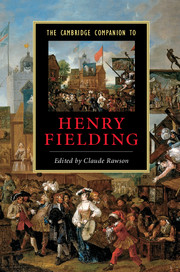Book contents
- Frontmatter
- Introduction
- 1 Henry Fielding’s life
- 2 Fielding’s theatrical career
- 3 Shamela
- 4 Joseph Andrews
- 5 Jonathan Wild
- 6 Tom Jones
- 7 Amelia
- 8 Fielding’s periodical journalism
- 9 Fielding and female authority
- 10 Fielding on society, crime, and the law
- 11 Fielding’s style
- 12 Fielding’s afterlife
- Guide to further reading
- Index
- Series List
2 - Fielding’s theatrical career
Published online by Cambridge University Press: 28 July 2007
- Frontmatter
- Introduction
- 1 Henry Fielding’s life
- 2 Fielding’s theatrical career
- 3 Shamela
- 4 Joseph Andrews
- 5 Jonathan Wild
- 6 Tom Jones
- 7 Amelia
- 8 Fielding’s periodical journalism
- 9 Fielding and female authority
- 10 Fielding on society, crime, and the law
- 11 Fielding’s style
- 12 Fielding’s afterlife
- Guide to further reading
- Index
- Series List
Summary
It is hard to avoid the teleological fallacy when considering Fielding’s plays: the fallacy, that is, of viewing his theatrical career entirely through the lens of later events, and of allowing these events to limit our sense of its scope, direction, and meaning. Two particular developments have dominated thinking about Fielding’s output as a dramatist, though neither of them fully explains it. The first came with the passage and implementation in June 1737 of the Stage Licensing Act, a stringent piece of antitheatrical legislation that limited to two the number of playhouses authorized to operate in London and subjected new drama to advance censorship by the Lord Chamberlain, especially on political grounds. Fielding was put out of business as a playwright, and theatre was stunted for decades. The second key event was more gradual and protracted: Fielding’s reinvention of himself as a novelist in the 1740s, and the steady elevation of his fiction to a canonical status that seemed to efface the plays or identify them as creative false starts.
For many of Fielding’s contemporaries, and in later accounts of his career, the Licensing Act was an ad hominem measure targeted by a wounded ministry against a single theatrical bugbear. ’the Legislature made a Law, in order merely to curb one private man', as James Harris bluntly put it in 1758. The truth is rather more complex, but Fielding was certainly a prime contributor to ministerial anxieties about the theatre, and the retaliatory clampdown his plays provoked conferred on them a lasting reputation as works defined and dominated by a specific political campaign.
- Type
- Chapter
- Information
- The Cambridge Companion to Henry Fielding , pp. 17 - 37Publisher: Cambridge University PressPrint publication year: 2007
- 3
- Cited by

